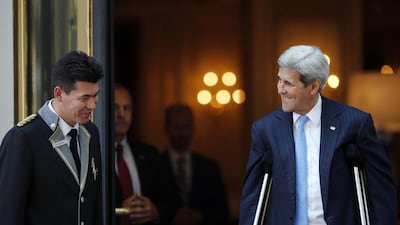VIENNA // Negotiators at the Iran nuclear talks plan to announce on Monday that they have reached agreement on a historic deal capping nearly a decade of diplomacy that would curb the country’s atomic programme in return for sanctions relief.
Two diplomats said that a provisional agreement would be announced but they cautioned that final details of the pact were still being worked out and a formal agreement still awaits a review from the capitals of the seven nations at the talks.
An Iranian official said that the agreement will run to roughly 100 pages.
A senior US official declined to speculate as to the timing of any agreement or announcement and noted that “major issues remain to be resolved in these talks.”
Movement toward a deal has been marked by years of tough negotiations. The current round in Vienna has run more than two weeks and blown through three deadlines.
“We are so close that if you look down from below you feel as if we have got there, but when you do get there you know there are still some steps to take,” the ISNA news agency quoted Iranian president Hassan Rouhani as saying. He also said a deal was “very close”.
“Thank God, I have kept my campaign promises for a settlement of the nuclear issue,” he added.
US secretary of state John Kerry, who on Thursday had threatened to walk away from the negotiations, said on Sunday that “a few tough things” remain in the way but added “we’re getting to some real decisions.”
En route to Mass at Vienna’s gothic St Stephens Cathedral, Mr Kerry said twice he was “hopeful” after a “very good meeting” on Saturday with Iranian foreign minister Mohammad Javad Zarif.
French foreign minister Laurent Fabius also was cautiously optimistic. “I hope that we are finally entering the last phase of this negotiation,” he said.
The pact is meant to impose long-term, verifiable limits on nuclear programmes that Tehran could modify to produce weapons. Iran, in return, would get tens of billions of dollars in sanctions relief.
The current round of nuclear talks is now in its 16th day and has been extended three times since the first deadline of March 31 was missed. The mood among negotiators had turned more sombre each time a new target date was set.
As the weekend approached, Mr Kerry declared the talks could not go on indefinitely and warned that the US could walk away from the negotiations.
But in another sign that a deal could soon be sealed, Russian news agencies reported that Russian foreign minister Sergey Lavrov planned to arrive in Vienna on Sunday evening.
Most other foreign ministers of the six nations negotiating with Iran already are in the Austrian capital and in position to join Mr Kerry and Mr Zarif for any announcement of an agreement.
Diplomats familiar with the talks said most of the nuts and bolts of implementing the deal have been agreed upon. But over the past week, issues that were previously on the back burner have led to new disputes. Among them is Iran’s demand for a lifting of a UN arms embargo and its insistence that any UN Security Council resolution approving the deal be written in a way that stops describing its nuclear activities as illegal.
A diplomat familiar with the negotiations said disagreements also persist on how long some of the restrictions on imports of nuclear technology and other embargoes outlined in any new Security Council resolution will last. The diplomat said restrictions will last for years, not months.
Despite Mr Kerry’s relatively upbeat take, comments by Iran’s supreme leader suggested that Tehran’s mistrust of Washington would persist no matter what the outcome of the talks.
Iran’s state-run Press TV cited Ayatollah Ali Khamenei on Saturday as calling the US an “excellent example of arrogance.”
*Associated Press, Agence France-Presse

